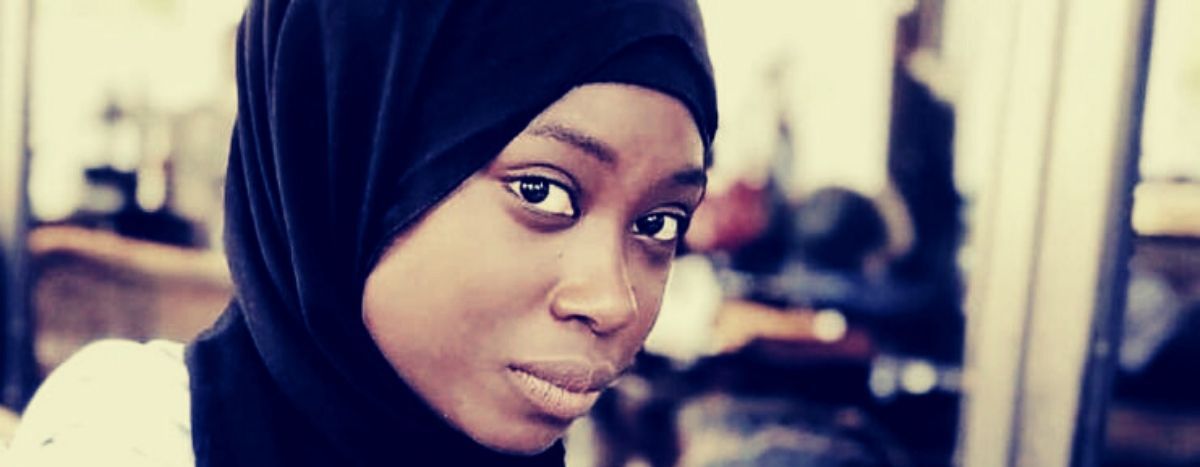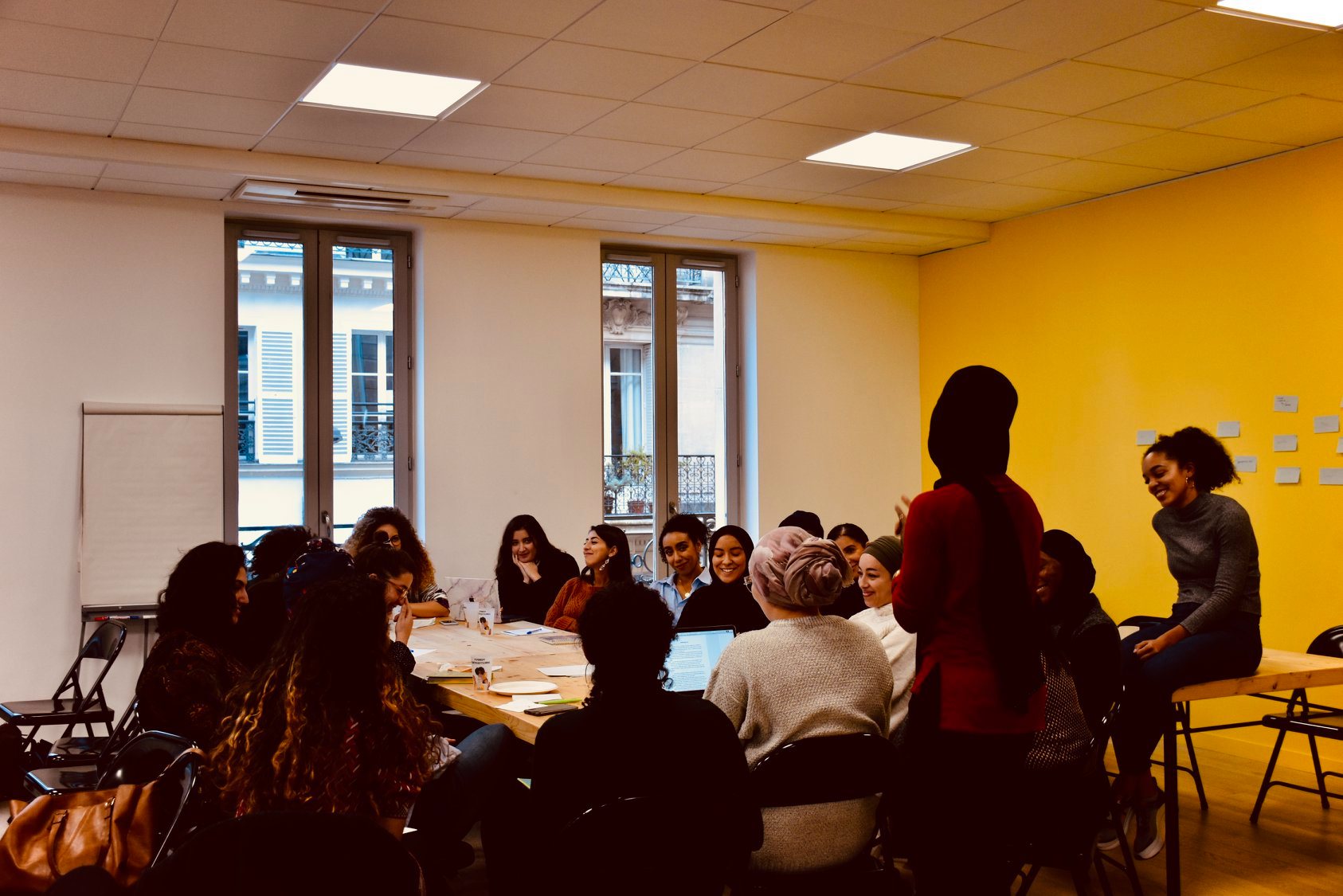
Amy Tounkara: “I was reading a lot, but couldn’t identify”
Published on
In recent years, France has seen an intensification of public controversies relating to Islam. In 2020, anti-Muslim actions grew by 53%, disproportionally affecting women. Despite this, these individuals' voices don’t seem to be acknowledged in the very public debate that targets them so vehemently. Amidst increasing discrimination, Black Muslim “artivist” and writer Amy Tounkara shows us one way out.
“I feel that nowadays, what was [once] the discourse of far-right groups is now widespread, normalized,” says Amy Tounkara, during a Zoom interview.
Since the 1980s, far-right political parties in France and across Europe have presented Islam as a “threat”, evoking ethno-centric and Islamophobic rhetoric that has since become hegemonic in media and political spheres. In April, civil society organizations attacked a bill supposedly designed to limit 'Islamic separatism' on the basis that it was discriminatory against Muslim people. The draft legislation would particularly impact women wearing the veil as it would forbid them from accompanying their children during public school trips.
But in this anxiety-provoking context who is sharing the voices of Muslim people - and women in particular? This is where "artivist" Amy comes in. She created La Femme en Papier, an online literary magazine dedicated to sharing her personal stories, together with those of other Black Muslim women. The objective? To question, challenge and re-imagine dominant narratives.
“I was reading a lot, but couldn’t identify. Then I came across a quote by Toni Morrison, “'If there's a book that you want to read, but it hasn't been written yet, then you must write it,' so I decided I'd represent myself.”
In her magazine, Amy writes vivid fictional texts or recounts her experiences, including childhood memories of hearing dehumanising history lessons about slavery. She also reflects on social issues such as the decision to wear the veil in sexist and Islamophobic contexts.
“It is possible to create a safe environment where women can speak quite freely.”
Amy organizes creative writing workshops in collaboration with Lallab, an organization which shares the plurality of female Muslim voices, and defends their rights. The collective nature of the workshops builds bonds and a sense of sorority between participants who often have little other opportunity to access spaces for creative expression.
“All the voices that I’m not used to hearing in the media, I hear them all at once,” Amy explains. Yet the workshops go far beyond the exercise of writing alone. “Thanks to popular education, it is possible to create a safe environment where women can speak quite freely,” says Amy.

Amy's goal is also to create a more representative French literature. “It is important to allow ourselves to dream and imagine... growing up I had never seen a Black Muslim Woman as the main protagonist in a story. In schools, we don’t really have access to such literature. I want to fight against different types of discrimination: sexism, racism, Islamophobia. Self-representation is an issue that touches every single person who is silenced.”
Nonmixity: “we don’t need to justify ourselves”
Amy’s workshops follow the principle of nonmixity - they are only open to Black Muslim women in some cases, or Muslim women, or black people, or women, and so on. Nonmixity has been widely criticized in the media for its “communitarian” nature, and sometimes by other feminist movements as well. Yet nonmixity is essential to many activists who feel like mixed spaces reproduce systemic oppressions and thus don't allow them to express their specific concerns without being questioned in suspicious and even aggressive ways.
To Amy, the fact that the workshops gather Black Muslim women is part of the “healing” process: “we don’t need to justify ourselves, to explain, we just speak about what we want, with the certainty that it will be received respectfully.”
France's Republican ideal envisions citizens as a unified mass, and it doesn’t acknowledge differences. This makes it hard for Muslim women to express their voices as “Muslim women” without being accused of being divisive. Even when they just want to exist politically with no link to their religion, these individuals struggle to be recognized as legitimate. For example, in 2018 Maryam Pougetoux, the president of a Parisian branch of the student union UNEF, was accused by the government of being an Islamic extremist just because she wears a headscarf.
“In France, some would like religion to be private and for public space to exist without religion,” Amy explains. But Amy notices how this injunction to reject Islam and confine it into the private sphere makes no sense, “as long as one considers what I wear as something of public debate.”
According to the researcher Horia Kebabza, a “new racism” has emerged, and it has changed its vocabulary: from biology to culture, from race to ethnicity. It has mostly become a “racism without race” in that it excludes not based on people’s "race" per se, but on the basis of someone's real or alleged cultural origins. Nevertheless, it has serious real-life repercussions for non-whites across the globe. In a recent report, the UN Special Rapporteur on freedom of religion or belief, Ahmed Shaheed, revealed how numerous governments as well as regional and international institutions have responded to security threats by adopting measures disproportionately targeting Muslims. Women are those suffering the most. Indeed, they face what Shaheed calls a “triple penalty”: as women, ethnic minorities and as Muslims.
From Feminism to Feminisms
As women across Europe increasingly question their identities we need to acknowledge the “flattening of difference” produced by a certain type of feminism; one which obscures various forms of oppressions, in particular oppressions affecting women of colour. Across Europe, this type of conservative, top-down feminism is slowly being replaced by more popular, diverse and honest manifestations of the movement.
“In France, we are finally speaking about FeminismS in the plural form. Before, I didn’t identify with the feminist movement because I viewed it as something quite homogeneous that sometimes went against my beliefs. Nowadays, I feel that it is possible to reclaim feminism. Personally I identify well with Afro-feminism and Muslim feminist movements. We then have the possibility of building links with other types of feminisms.”
According to a recent Forus report on how to create an enabling environment for civil society, collectives and activists dismantling gender stereotypes are among the most vulnerable to attacks, impunity and discrimination even within feminism itself. That's exactly why Amy is asking: what next? How do we shift from individual to collective experiences and solutions?
The power of words is hard to dismiss. They form our stories, our memories and historical archives. In a world thirsty for up-to-date narratives that reflect the diversity of our communities, Amy is contributing healing, emancipatory workshops that are also alternative spaces for dialogue and exchange. They are playing their own role in “the big shift.”



